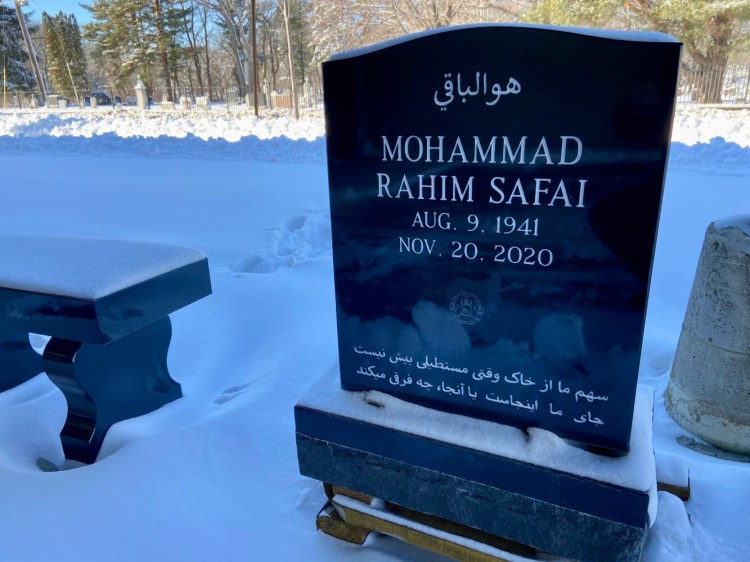A fund has been set up for donations to help a Westbrook widow who has been blocked from placing a headstone on the grave of her late husband, a former Afghan general who died of COVID-19.
After the Press Herald published her story Monday, dozens of readers contacted the paper and the reporter, asking how they could make a contribution.

Mohammad Safai of Westbrook, a retired general in the Afghan army, died of COVID-19 on Nov. 20, 2020, at age 79. Photo courtesy of Asila Gul Mohammad
The headstone was paid for by community members and engraved in Mohammad Safai’s honor. But the city of Portland’s General Assistance program has prevented its placement on his grave in Evergreen Cemetery until his widow, Shafia Safai, repays just over $4,000 in cemetery and burial costs. It is the latest challenge facing a woman who has endured tremendous loss in her life.
Clients of the GA program sign an agreement promising to reimburse the city when they are able, and installing a headstone before that debt is paid would violate the contract, city officials said. Meanwhile, the headstone sits at the stonecutter’s shop.
Friends of Shafia Safai, including an immigrant advocate and an immigration attorney, set up the trust account to receive donations that will be used to pay the cemetery and burial fees as well as any other expenses the family incurs related to health care, immigration or settling in the United States.
“Shafia is so overwhelmed and appreciative,” Ghomri Rostampour, an immigrant advocate and family friend who helped to set up the trust, said of the public response. “There are so many kind people out there. It’s amazing.”
Rostampour, who lives in South Portland, collected a little over $3,000 last year from fellow Kurdish Americans in Greater Portland to purchase the headstone. When Safai died Nov. 20, 2020, at age 79, his family couldn’t afford burial costs, so Portland’s GA program for people in need covered the fees.
Then Rostampour learned last month that the headstone could not be installed until the family reimbursed the city for burial costs. The family still doesn’t have $4,000 to spare. Before the story was published this week, Rostampour was unsure what to do next.
The Mohammad R. Safai Family Trust was set up Tuesday by Jennifer Atkinson, an immigration attorney in Damariscotta who is working with Afghans seeking asylum in Maine after U.S. troops withdrew from their country. An estate attorney helped to draft the trust document.
The trust was established to ensure that donations to Shafia Safai won’t jeopardize what little government assistance she receives as an asylum seeker, such as housing and food, Atkinson said.
“It’s partly why she’s so impoverished,” Atkinson said, “because she’s not eligible for (the level of) benefits that are available to people who have been granted asylum or have a green card.”
Mohammad and Shafia Safai came to Maine from Afghanistan in 2013, visiting a daughter who had settled here with her husband and five children. The daughter died unexpectedly of cancer later that year, leaving the elderly couple largely alone in their Westbrook apartment, with several grandchildren living in Greater Portland.
Son of a federal judge, Mohammad Safai attended military college in Kabul and rose to the rank of general in the Afghan army, fighting the Soviets and the Taliban.
Shafia Safai was a schoolteacher who had six children. The Taliban killed one son in 2001 for failing to comply with the oppressive Islamist regime and a second son in 2010 for working with U.S. forces.

Shafia Safai stands in Evergreen Cemetery, where only roses mark the grave of her late husband, Mohammad Safai. Ben McCanna/Staff Photographer
After their daughter died while they were visiting Maine, they applied for asylum to help care for her children. Seven years later, Shafia Safai finally got an interview with immigration officials last September – nearly a year after her husband died.
Now 66, Safai is still waiting to learn if she has been granted asylum or must return to Afghanistan. If she’s granted asylum, Atkinson said, it could be several years before Safai receives a green card granting her permanent resident status, a process that can cost more than $2,000.
Safai cannot speak English and cannot work without asylum status. Among her three children who are still alive, a daughter in Switzerland would like her mother to move there, but Safai cannot get travel documents without an official immigration status.
Another daughter is living as a refugee in Turkey, and a third daughter is living in Afghanistan. She was a schoolteacher before the Taliban assumed power last summer and recently was denied her application to come to the United States. Safai worries about that daughter especially, and about a granddaughter in Afghanistan who can no longer attend school.
“It is too much for me to carry all this sorrow,” Safai, speaking through an interpreter, said of the losses her family has endured.
The trust set up for Safai has been approved by her and registered with the Internal Revenue Service, Atkinson said. It has its own post office box and will be overseen by trustees, including Rostampour, who will disburse funds at Safai’s request.
Donations will be deposited into a dedicated account with Bangor Savings Bank. Checks or money orders should be made out to the Mohammad R. Safai Family Trust and mailed to P.O. Box 464, Damariscotta, ME 04543.
Comments are not available on this story.
Send questions/comments to the editors.


